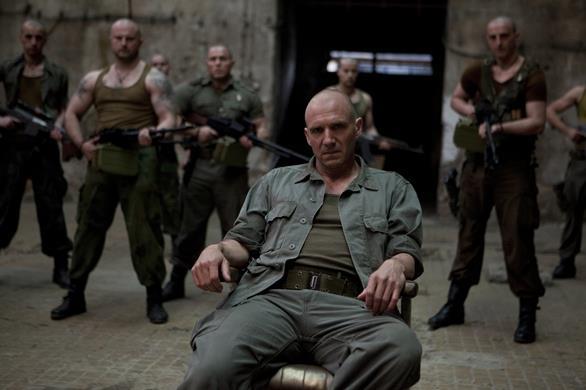As Ralph Fiennes and Gerard Butler, covered in dirt, sweat and blood, grapple violently on the floor, in a surprisingly similar manner to Alan Bates and Oliver Reed wrestling nude in Women In Love, it should be clear that this is not your standard Shakespeare adaptation. This is the Bard stripped down to barest essentials and shifted to what looks like the modern day Balkans. Coriolanus, about the titular Roman general who is banished and swears revenge against his own people, is renowned as one of Shakespeare's densest and most convoluted plays, and Fiennes deserves praise for not only clarifying the narrative but bringing to the fore themes that make it a surprisingly contemporary film. It's obvious questions about class war, democracy and the nation state make it a fitting film to come at the end of a year of rolling news, increasingly violent protest and the Arab Spring. Even a cameo from Jon Snow, speaking full Shakespearean verse, feels un-gimmicky and strangely appropriate.
Fiennes does a perfectly adequate job behind the camera, making the explosive battle scenes unbearably intense, but he does an exemplary job in front of it. Acting with his entire body, he turns a pitiless, fascistic brute into a scarily charismatic figure; his eyes alone carrying a singular determination that is almost terrifying. Coriolanus is not an easy figure to engage with and Fiennes makes no attempt to soften his disdain and contempt for the masses. He's helped by some stunning support from Jessica Chastain (continuing her quest to be in every single film ever released from now on), Brian Cox and James Nesbitt, and even Gerard Butler turns in a fine performance as Coriolanus' sworn enemy. But casting a shadow over the film is the presence of Vanessa Redgrave as Coriolanus' manipulative mother. She runs away with every single scene she is in and reminds those who needed reminding that when she is on form, no actress on Earth can touch her. It's a towering performance that in any sane world would have seen her name in every single Best Supporting Actress list; clearly this is not a sane world. Her performance, contrasted with Chastain's, adds an interesting female element to the film; of the two major female characters in this predominantly male world of war and politics, one is meek and timid and the other manipulative and matriarchal. Like with many boxing movies, Coriolanus shows how in an overly aggressive, male dominated world such as that of the film, women are pushed to the sidelines, where they are forced to either look on in horror or egg on those in the ring for their own benefit. Combined with it's questions about politicians and the masses, and the corrupting nature of power, Coriolanus is a raw, brutal and primal film that unceremoniously but very effectively dumps Shakespeare right into the middle of the new decade.
